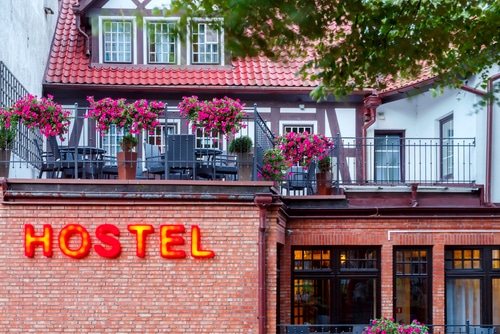Key Highlights
- Hostels are affordable places where people can stay. They are popular with solo travelers and digital nomads.
- You can find several room types, like dorms with bunk beds and private rooms.
- There are shared areas, such as communal kitchens and common rooms, which help people connect.
- You usually book a hostel online, and they often have flexible check-in times.
- Hostels fit many travel styles, including party hostels, boutique options, and eco-friendly stays.
- They usually have safety features like lockers, CCTV, and 24-hour receptions, making them safe for guests.
Hostels are great for people who love solo travel or live as digital nomads. They provide more than just a bed to sleep in. You can explore local cultures, meet other travelers, and save money while you are on the move. Hostels are designed for interaction and connection. They give you a feeling of community, sharing, and adventure, which is perfect for those who want more than just a private place to stay.
Understanding Hostels: Essential Basics for New Travelers
Many new travelers often wonder what sets a hostel apart from regular places to stay. The main difference is usually cost and how people have fun interacting in hostels. Unlike hotels, which can feel lonely, hostels offer shared dorm rooms and common areas. This setup makes it easier to make friends and enjoy spontaneous adventures.
If you want to save money or meet travelers from different places, hostels are a good option. They offer a nice mix of comfort and socializing. Hostels work for all kinds of travelers. If you are a digital nomad searching for a place to work or a first-time traveler who wants to make new friends, hostels have a spot for you.
Defining a Hostel: More Than Just Cheap Lodging
A hostel is a unique place to stay. It is known for being affordable and having a fun, friendly atmosphere. It used to mainly serve students and backpackers. Now, more people are choosing hostels, including solo travelers, couples, and families, because of their flexible options.
Hostels are different from hotels because they emphasize living together. You will often find shared dorm rooms with bunk beds in hostels. However, there’s more to it. Many hostels now offer private rooms as well. This allows guests to save money but still have a private space when they need it.
Choosing a budget-friendly option does not mean you miss out on the experience. In fact, hostels are friendly places. Guests share meals, travel stories, and build lasting friendships. All this happens while you find one of the most affordable ways to see new parts of the world.

Key Differences Between Hostels and Hotels
When you choose between hostels and hotels, understanding the main differences can help you find the best fit for your travel style. Hotels give you private rooms and bathrooms. This means more privacy and extra services like daily cleaning and room service. On the other hand, hostels usually have dorm rooms with bunk beds. Here, guests share space and costs with each other.
In hostels, privacy varies. Some have private rooms for guests who need alone time. Many hostels offer shared kitchens. This space allows guests to prepare their meals. It is perfect for those on a budget or anyone craving a late-night snack.
Another big difference is the vibe. Hotels tend to feel more formal and private. On the other hand, hostels offer a fun and friendly atmosphere. With activities like games in the lounge and sharing meals in the kitchen, hostels help you connect with new people. You can enjoy a more active travel experience there.
How Hostels Operate: A Peek into Their Functioning
Are you curious about what it’s like to live in a hostel? Hostels are basic and adaptable places. They focus on creating a friendly and social atmosphere for travelers. You will often find open lounges, group activities, and opportunities to meet people from different countries.
The process is usually simple. You book your bed, arrive on time, and enjoy the common areas. The hostel staff are often travelers as well. They help make a cozy and friendly atmosphere. They ensure you have a good time and that your stay is comfortable.
Common Areas and Shared Facilities
One key aspect of hostels is the shared facilities that help people feel comfortable and connect with one another. The common room is usually the main area of the hostel. It features comfy couches, games, books, and sometimes entertainment options like TVs or Netflix. This space is perfect for making new friends while sharing travel stories and playing card games.
Most hostels provide free wifi in their common areas. The connection speed can vary, especially in far-off places. However, this access is great for digital nomads, frequent travelers, or anyone who wants to stay connected while on the go.
Hostels offer different types of rooms to fit various likes and budgets. Dorm rooms are the most common option. They have several bunk beds and shared bathrooms. Staying in a dorm room is usually cheaper. It also allows you to meet new friends since you share the space with other travelers.
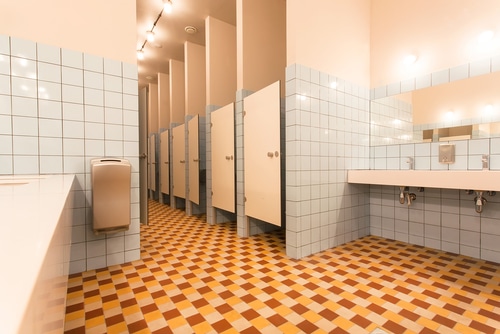
Types of Rooms Available in Hostels
Hostels offer different types of rooms to fit people’s needs and budgets. Dorm rooms are the most common option. They come with several bunk beds and shared bathrooms. A dorm room is a cheaper choice. It also allows you to meet new friends since you share the space with other travelers.
If you want more privacy, many hostels have private rooms. These can be simple single rooms or double rooms. Some might even come with their own bathrooms. This way, you enjoy affordable hostel rates while getting extra privacy. Families or couples who want to be more private can find family rooms that fit more guests.
Hostels offer more than just places to sleep. You can find mixed-gender dorms, rooms just for women, and pod-style beds that give you extra privacy. They are always changing to meet the needs of travelers from all over the globe.
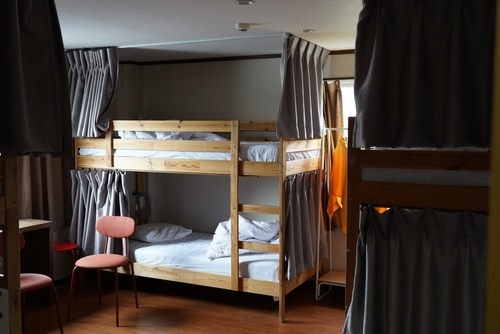
Booking Methods and Check-in Procedures
Booking a hostel is now very easy. Most travelers use online booking sites. These sites let you compare prices, amenities, and reviews from recent guests. To secure your spot, choose your room and pay a small deposit. A confirmation email will then give you all the details you need.
When you get there, go to the reception desk with your ID and booking information. The hostel staff will help you. They know about local attractions and will give you a short introduction to the place. They will also give you your room key and tell you the house rules and any activities coming up. Check-in usually starts in the afternoon, but if you arrive early, many hostels have a place to store your luggage.
Here’s a simple summary of usual booking and check-in practices:
| Booking Method | Confirmation | Check-in Time |
|---|---|---|
| Hostel website | Instant/email | Usually 2-3 PM |
| Booking platforms | Instant/email | Usually 2-3 PM |
| Walk-ins | Subject to availability | Varies by hostel |
Step-by-Step Guide to Using Hostels
Your time in a hostel can be fun if you get ready a bit. Each choice you make, like selecting your hostel and getting comfortable, can help make your stay easier and better. A highlight is when you use the common areas and take part in activities with other guests. This can make your trip really memorable.
To feel ready for hostel life, you should know what to expect. It’s important to pack wisely and stay open-minded. If you follow these simple tips, even people new to this can enjoy their time in a hostel with confidence and ease.
Step 1: Choosing the Right Hostel
Choosing the right hostel can make a big difference in your trip. First, think about where you want to stay. Do you want to be near the city center, close to restaurants and nightlife, or in a calmer area for some peace? Look at maps and neighborhood guides to see if the hostel’s location suits your travel needs.
Take time to compare prices. Hostels can be cheap, but some offer good amenities or are in nice locations. This can make their prices a bit higher. Always consider what you get for that price. Make sure it fits your budget and travel style.
Lastly, reviews are the best bet for getting real opinions. Look at the comments about the atmosphere, cleanliness, and safety. Other travelers will tell you if the hostel is great for solo travelers, party lovers, or those who want a quieter vibe. A hostel that has high ratings in these areas is likely a safe choice.
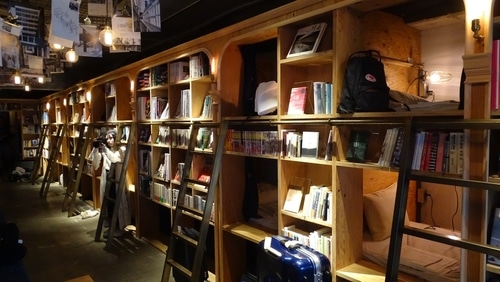
Step 2: Making Your Reservation
Once you find the right hostel, it is simple to book your spot. Most travelers check booking websites or the hostel’s website to reserve a bed or room. You usually have to provide some personal information and, often, a small deposit to secure your reservation.
After you book, you will receive a confirmation email. This email will include all the important details, such as the address, check-in instructions, the hostel’s contact information, and sometimes travel tips made just for you. Be sure to save this email or print it out. It will help avoid any problems when you arrive.
Make sure you read the hostel’s rules. Check the rules about check-in, cancellations, and payment due when you get there. Knowing these things in advance helps you avoid confusion. This way, you can have a smooth start to your trip.
Step 3: What to Pack for a Hostel Stay
Packing for a hostel stay is simple, but having some smart items can improve your experience. Hostels often provide bedding, but bringing a sleeping bag liner is a good idea. This helps if you’re going to a remote place or want extra cleanliness.
A padlock is really important. Most hostels have lockers where you can keep your valuable things safe. If you bring your own padlock, it will fit better and help you feel more secure. Don’t forget to pack toiletries as well. Hostels may offer basic soap and shampoo, but it’s a good idea to have your own. Also, remember to bring a quick-dry towel and flip-flops for shared bathrooms.
You may want to bring earplugs if you sleep lightly. A portable charger for your devices is a good idea too. Don’t forget a travel journal. This will help you remember the new friends and stories you collect during your trip.
Step 4: Checking In and Settling In
When you arrive, head to the reception desk to check in. The friendly hostel staff will need your ID and confirmation. After that, they will hand you your room key. In some places in Europe and Asia, you might need to leave a small deposit or your passport. They will go over the rules, show you around, and help you meet other guests.
When you arrive at your room, pick a free bed if you are in a dorm. Place your belongings in a locker and get comfortable. Store any valuable items in your locker using your padlock. Keep your toiletries and other essentials close by.
Take some time to look around. Visit the common areas, read the notice board for events or activities, and get to know your roommates. Getting settled in early will help you feel comfortable in the hostel and start making friends quickly.

Step 5: Making the Most of Hostel Amenities
Hostels have a lot of great features that can make your stay enjoyable. Most of them offer free breakfast. This could be something simple like toast and fruit, or it might include pancakes and pastries. You can enjoy this shared meal to meet new friends and have a good start to your day.
You can find social events like pub crawls, movie nights, and group dinners often. These activities are great for meeting people from various places. You can learn about the local culture and even discover some hidden gems in the city.
Hostels can offer more than just meals and events. They might have extras like bike rentals, laundry rooms, and help with tours. Some hostels also feature swimming pools, rooftop bars, or yoga classes. Make sure to ask the hostel staff about all the amenities they provide—you may discover some unforgettable experiences!
The Diversity of Hostel Types
Hostels are different for everyone. They have various styles and special vibes, just like the guests. If you want a fun social scene, good amenities, or a place that cares about the environment, there is a hostel for you.
You can pick from fun party places in lively cities, nice boutique hostels, or green spots in nature. There is a unique kind of hostel for every traveler. Looking into your choices can help you find the best one for your journey.
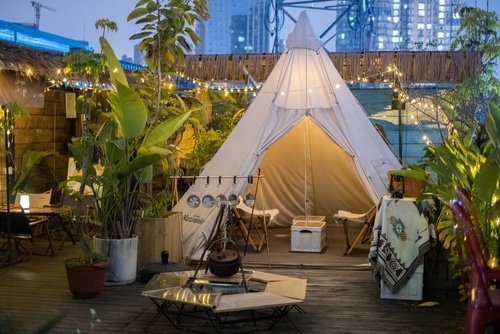
Party Hostels for the Social Butterfly
If you want to meet people and enjoy your nights, party hostels are perfect for you. These fun places have a great atmosphere, exciting events, and bars that keep the party going late. You will find many chances to socialise, like during happy hour and nightly pub crawls.
Party hostels often organize drinking games, club nights, and city tours. This helps you meet other travelers easily. The lively atmosphere draws in solo travelers and groups who want wonderful nights out and new friends.
These hostels can be noisy and full of life. If you want to sleep peacefully, a quieter hostel might be a better choice. However, if you want fun experiences and interesting stories, party hostels offer a special social adventure.
Boutique Hostels for a Dash of Luxury
Boutique hostels have changed how we view budget-friendly places to stay. These cool spots offer affordable prices and a friendly atmosphere. They come with nice features such as comfy beds, private bathrooms, and unique decorations. These decorations are inspired by local art and design.
Many boutique hostels have great amenities. You will find good quality sheets, cozy common rooms, nice kitchens, and sometimes extra things like yoga studios, rooftop decks, or even pools. Each boutique hostel is unique. They can have a sleek minimalist look or really fun, artistic styles.
These hostels are great for travelers who want a fun stay without paying a lot for a hotel. Boutique hostels offer a special and cozy feel. You can feel comfortable and have privacy while still enjoying the friendly vibe that makes hostelling a good experience.
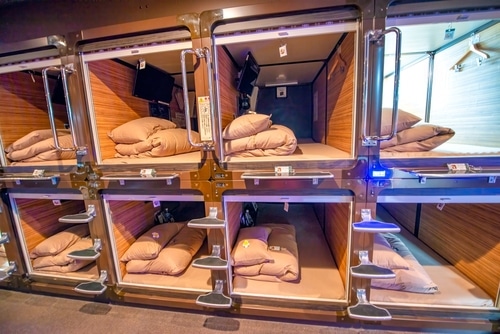
Eco-Friendly Hostels for the Green Traveler
For travelers who care about the environment, eco-friendly hostels are a great option for accommodation. These places feel comfortable and use green materials. They also rely on energy sources like solar power. Additionally, they practice recycling and composting to reduce waste.
Many eco hostels have green certifications. They use water-saving methods. They also offer organic food from local sources. This helps guests reduce their carbon footprint. You may find features like community gardens, bike rentals, or rainwater collection systems.
Staying in an eco-friendly hostel helps the planet while you explore new places. It is a great way to make your trips better for the environment. You will meet other people who feel the same and have a special experience.
Safety in Hostels: Ensuring Your Well-being
Safety is really important for many travelers. Hostels are built to address these safety concerns. Most hostels have secure entry systems and personal lockers. They also have staff available at the reception 24/7. This makes guests feel safe all the time.
Staying in a hostel can be safe for solo travelers, groups, and families. You just need to follow some simple steps. Make sure your belongings are secure. Also, pay attention to what is happening around you. A good hostel and a bit of planning can make your stay easy and fun for all the right reasons.
Personal Safety Tips
When you think about safety in hostels, it’s key to use common sense. Always use the lockers for your valuable belongings. Bringing your own padlock can help you feel more secure. Do not leave expensive items, like gadgets, passports, or cash, out in the open, even if your roommates seem nice.
When you get there, it’s a good idea to find out where the emergency exits are. Also, learn the safety rules of the hostel. If you are traveling alone, make sure to tell your friends or family about your plans. Keep local emergency numbers close to you.
Joining hostel activities is a great idea. Exploring with a group keeps things safe and makes your trip more fun. If you stay aware, be friendly, and take small steps, your time in the hostel can be safe and enjoyable.
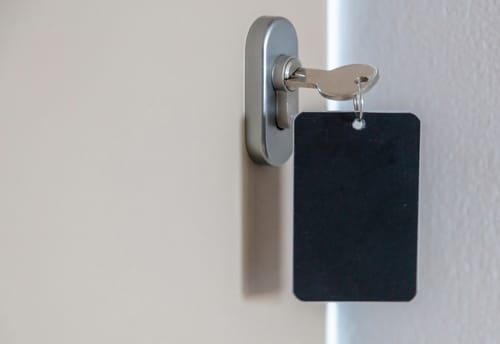
Security Features Commonly Found in Hostels
Modern hostels aim to keep guests safe and relaxed. Many of them use CCTV cameras at the entries and shared areas. This helps prevent any bad behavior.
Key card access is a common security feature. It allows only registered guests to enter. Guests also get special access to certain rooms or floors. This helps keep the dorms safe and private.
Most hostels have a reception that is open all day and night. The staff is there to help you with late check-ins, emergencies, or any questions about the area. You can feel safe because there are both automated and human safety systems in place. This way, you can enjoy your time without worrying about your safety.
Hostel Resources for Travelers
Summary
Hostels are a great choice because they are affordable, have a friendly community feel, and offer adventures. This can really enhance your travel experience. By checking out different types of hostels—like lively party spots or calm eco-friendly places—you can find the one that fits your style best. Being in a shared space allows you to meet other travelers and share stories from around the globe. This can make your experiences even more enjoyable. It’s important to check the hostel’s amenities and security features to feel safe and comfortable. Whether you travel often or are just getting started, hostels are a fantastic way to explore new places and connect with people like you. Happy travels!
Frequently Asked Questions (FAQs)
Why are hostels cheaper than hotels?
Hostels cost less than hotels because they share space and have fewer amenities. They often offer dormitory-style rooms. By providing lower rates for beds, hostels reduce costs. This allows guests to save money while still enjoying a comfortable and friendly stay.
Can families stay in hostels?
Many hostels offer family rooms that are great for kids. They provide private spaces and extra amenities for both parents and children. The lively shared areas add excitement, but families can also enjoy privacy and comfort. This makes hostels a smart option for budget-friendly group travel.
What should I look for when choosing a hostel?
When choosing a hostel, consider its location, safety, and guest reviews. Look for hostels that have high ratings and are in safe neighborhoods. Pay attention to comments about cleanliness and staff friendliness. Reviews will give you an idea of the hostel’s atmosphere and ensure it meets your travel needs.
